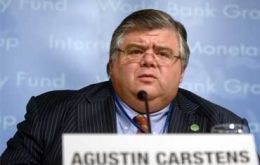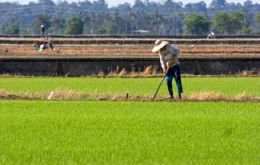MercoPress. South Atlantic News Agency
Tag: Latam
-
Friday, July 22nd 2011 - 06:20 UTC
Brazil: record low unemployment and more job-creation in second half anticipated

Brazil’s unemployment rate fell to its lowest since January in spite of efforts by policy makers to cool growth and inflation in Latin America’s biggest economy. The jobless rate fell to 6.2% in June, from 6.4% in May and 7% a year earlier, the national statistics agency said in a report distributed in Rio de Janeiro.
-
Friday, July 22nd 2011 - 01:59 UTC
Weak Spanish government conditions enthusiasm for an EU/Mercosur deal

The Spanish government's enthusiasm for an European Union free-trade agreement with Mercosur remains solid and Madrid seems willing to put some sectors of agriculture at risk in exchange for access to new markets for the country's multinationals.
-
Thursday, July 21st 2011 - 23:45 UTC
Latam regional integration is “too slow” given the challenges says UN expert

The current regional integration of Latin America is too slow in light of the challenges the region faces, a United Nations economic agency official said on Wednesday, calling for greater efforts to rev up the process.
-
Friday, July 15th 2011 - 06:04 UTC
China forecasted to become Latin America’s second trade partner by 2015

China will become Latin America's second largest trade partner as early as in 2015, the UN Economic Commission for Latin America and the Caribbean (ECLAC) said this week.
-
Wednesday, July 13th 2011 - 21:30 UTC
South America forecasted to grow 5.1% in 2011, but with serious challenges

Latin America and the Caribbean will maintain the recovery that began in the second half of 2009, following the international economic crisis and are poised to grow 4.7% in 2011 with a strong boost from domestic demand, according to the latest report from the Economic Commission for Latin America and the Caribbean.
-
Thursday, July 7th 2011 - 09:54 UTC
Trump opens 70-story luxury hotel in Panama, the tallest building in Latin America

Untied States billionaire Donald Trump marked his entry into Latin American real estate Wednesday with the opening in the capital of Panama of his 70-story luxury resort, the tallest building in Latin America.
-
Thursday, June 30th 2011 - 07:17 UTC
UN Economic Commission raises Latam’s growth estimate: 4.5% to 5%

The UN Economic Commission for Latin America and the Caribbean, Eclac, raised its 2011 growth estimate for the region to between 4.5% and 5%, said Executive Secretary Alicia Bárcena.
-
Monday, June 27th 2011 - 06:44 UTC
Australia, Canada and most of Latam support Mexican candidate as IMF chief

Australia and Canada said they support Mexican central bank Governor Agustin Carstens for the top job at the International Monetary Fund over his rival Christine Lagarde, the French finance minister.
-
Monday, June 27th 2011 - 06:40 UTC
Global rice production reaches 476 million tons in 2011; strong Mercosur recovery

Global rice production is expected to touch 476 million tons in 2011, on the back of improved weather conditions, as the influence of La Niña is expected to neutralize by June, United Nation’s body FAO said.
-
Monday, June 27th 2011 - 06:30 UTC
Food inflation in Latam and Caribbean averaged 7.4% in May

The inflation for food items in Latin America and the Caribbean reached 7.4% in May, according to FAO. The sharp rise in the regional prices was attributed to an even sharper increase in food prices which on a world wide basis rose 37% in May compared to world food prices in May 2010, the FAO said in a report from its regional headquarters in Chile.
